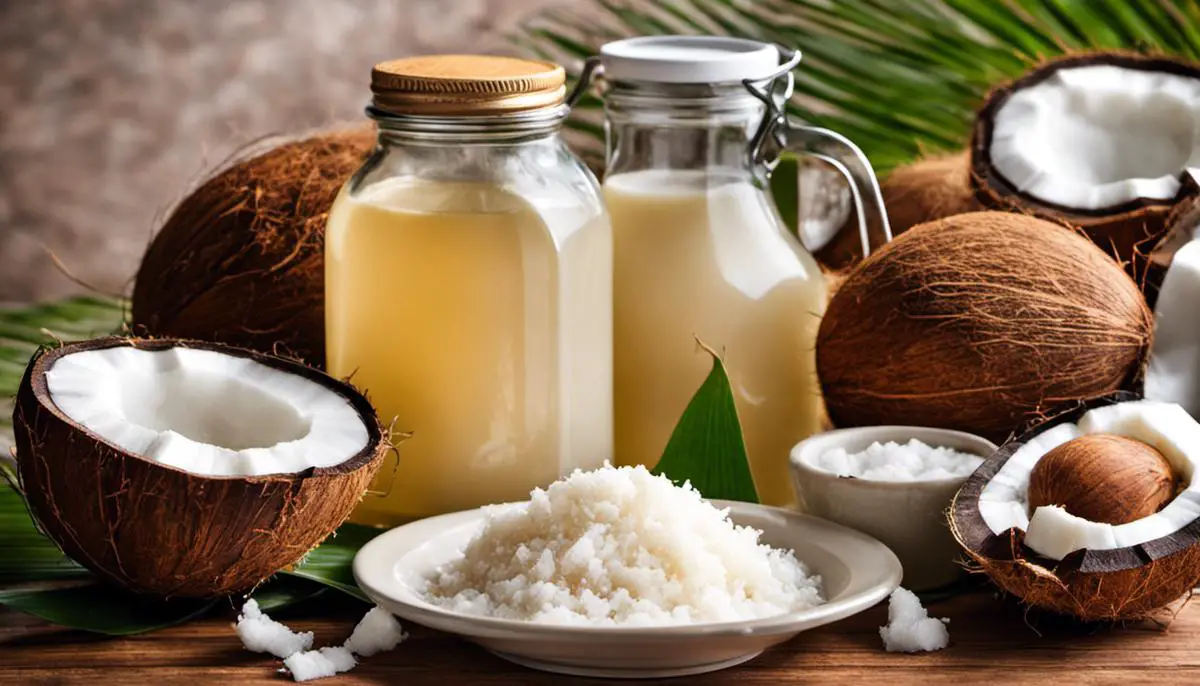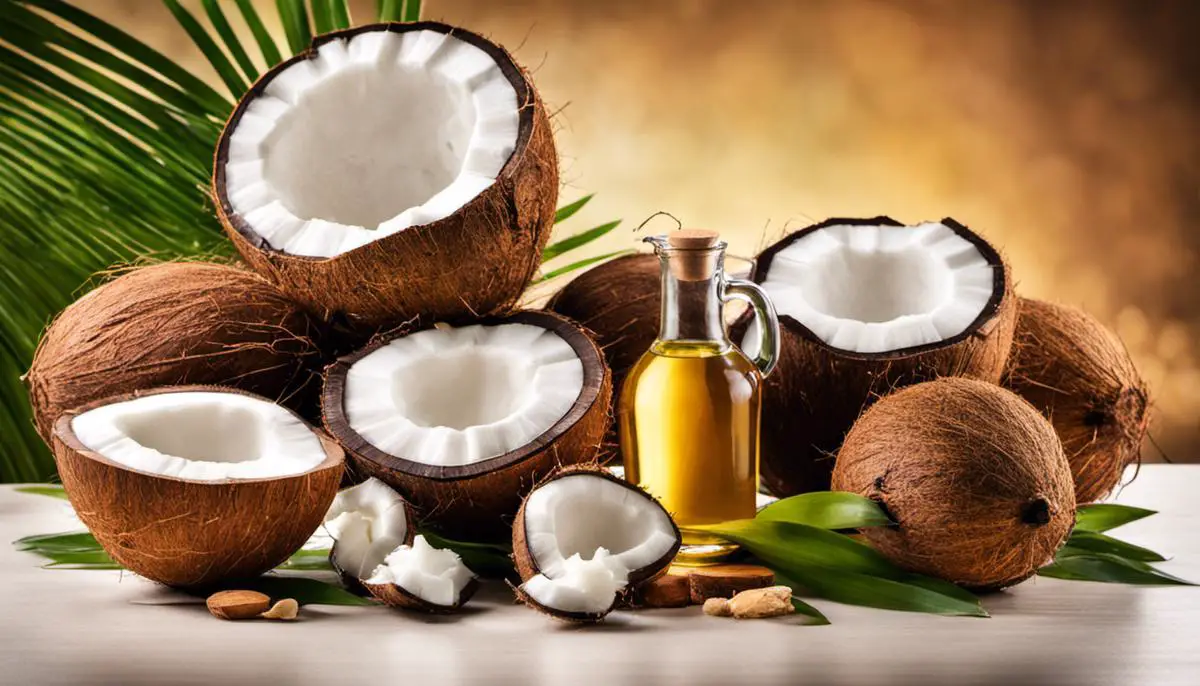Table of Contents
The bountiful gifts of the tropical coconut palm go far beyond its luscious fruits. This versatile plant serves as a vital source of a vast variety of natural products, from coconut oil and milk to flour, water, and sugar, which are celebrated for their unique properties and significant health benefits. The extraction processes used to generate these products are designed to preserve their organic nature and essence, ensuring their ultimate purity and quality. Moreover, the coconut industry is not just about delivering nutrient-rich, wholesome products. It simultaneously holds a crucial role in promoting sustainable agricultural practices and observing ethical standards. This introduces a broader perspective on the importance of choosing coconut products that are not just beneficial to our health, but also contribute to the welfare of the environment and society at large.
Understanding Different Types of Natural Coconut Products
An Introduction to Natural Coconut Products
From the versatile coconut comes a plethora of unique products, each possessing distinctive characteristics and utilities. Among the most popular is coconut oil, procured from the meat or kernel of mature coconuts. Esteemed for its health benefits, it is frequently utilized in both cooking and beauty regimens.
Coconut milk, a luscious, velvety liquid derived from grated coconut meat, is another valuable product. It is essential in Southeast Asian cuisines and growing in global popularity due to its dairy-free attributes.
Then there’s coconut flour, a gluten-free counterpart of the traditional wheat-based flour. It is produced by drying and pulverizing the remaining pulp after the extraction of coconut milk.
Coconut water, on the other hand, is the clear liquid within young green coconuts and serves as a natural and invigorating source of electrolytes—a hit amongst health-conscious individuals.
Coconut sugar, acquired from the sap of coconut palms, presents a healthier alternative to regular sugar due to its lower glycemic index and the retention of some minerals from the palm.
Finally, coconut soap is a delicate, natural skincare option crafted from saponified coconut oil, often mixed with other beneficial elements.
These diverse offerings showcase the versatility of the coconut, exhibiting the multitude of benefits it provides. Each product, with its unique properties and applications, caters to a broad spectrum of culinary, nutritional, and cosmetic needs. They stand as a testament to the rising trend of utilizing natural and organic products in a bid to secure health benefits without inflicting harm upon the environment.

Health and Nutritional Benefits of Natural Coconut Products
The Healthful Advantages of Natural Coconut Products
Brimming with a rich variety of wholesome nutrients, natural coconut products offer a host of health benefits. They are abundant in dietary fiber that aids in promoting efficient digestion and regular bowel activities. Furthermore, these natural products are a rich source of health-positive fats, specifically medium-chain triglycerides (MCTs). These particular fats are directly metabolized from our intestines and transported to the liver where they can be utilized instantly for energy or converted into ketones. Ketones are neuroprotective compounds, currently under analysis for potential therapeutic properties against conditions like epilepsy and Alzheimer’s.
Exploring the Nutritional Value of Coconut Products
With a significant mineral content, coconut products are an excellent source of manganese, copper, iron, and selenium. Notably, manganese aids in bone health and contributes to the metabolism of carbohydrates, proteins, and cholesterol. Simultaneously, copper and iron play a critical role in the formation of red blood cells. Selenium, on the other hand, serves as an antioxidant. Apart from these, coconut products also offer minor quantities of potassium, zinc, and phosphorus. If you’re aiming for weight management, coconut products can prove advantageous due to their ability to enhance satiety and stimulate metabolism. Additionally, for skincare enthusiasts, coconut oil has earned accolades for its moisturizing and antibacterial attributes.

Sustainable and Ethical Practices in the Coconut Industry
The Importance of Sustainable Farming in Coconut Production
Sustainability and ethical practices have become pivotal in the contemporary world, and the coconut industry is no exception. It begins with the basic farming operations where the use of organic and conscientious techniques are on the rise. This involves leveraging natural fertilizers, employing biological pest deterrents, and adopting practices that increase soil fertility, thus negating the need for harmful chemical applications. Moreover, it emphasizes responsible farming that promotes crop rotation, intercropping, and soil conservation to ensure land remains productive over long periods. Such measures not only augment the quality and nutritional goodness of the coconuts but also uphold the ecosystem’s vitality and preserve soil integrity.
Ethical Labor Conditions and Environmental Impact
Aside from farming practices, labor conditions are a significant factor in the ethical considerations of coconut production. Many coconut farmers are paid meager wages, and sometimes child labor is exploited. Ethically sourced products ensure that farmers and workers are paid fair wages, have safe working conditions, and that no child labor is used. Certifications such as Fair Trade are often used to confirm these standards. Moreover, the coconut industry has an impact on the environment. Large scale plantations can result in deforestation and loss of biodiversity. Responsible companies are now focusing on minimizing these impacts by implementing sustainable practices such as recycling, waste reduction, and efficient energy usage. Efforts are also made to source coconut products from small, diverse farms rather than monoculture plantations to promote biodiversity and prevent deforestation.
Choosing Sustainable and Ethically Sourced Coconut Products
Consumer choices play a key role in supporting sustainability and ethical practices within the coconut industry. By choosing products with sustainability and fair trade certifications, consumers can ensure that they are contributing to the improvement of farming practices, labor conditions, and environmental impacts globally. These verified products often provide more nutrient-rich, natural coconut products. They also ensure a sustainable, fair, and ethical chain of events from the coconut tree to the consumer’s hands. Thus, conscientious consumers have the power to make a significant positive impact on the lives of farmers, workers, and the health of the planet.

The wealth of health and nutritional benefits offered by organic coconut products extends far beyond their delightful flavors. They serve as a source of vital nutrients that can potentially aid in digestion, hydration, weight loss, heart health, skin health, and more. Nevertheless, the goodness of coconut products is far from being confined to their nutrition profile. The processes and principles followed in producing these items occupy an equally crucial place in building an ecologically balanced and socially responsible world. By choosing sustainably grown and ethically produced coconut products, consumers can make a significant contribution to promoting fair trade practices, protecting the environment, and advancing the overall quality of human life.
